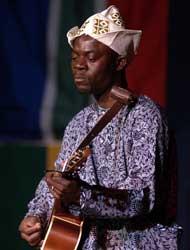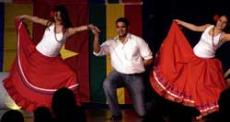World Class: Annual International Banquet 2006
The International Student Council held its annual World Festival Banquet Saturday night to showcase and honor the international students at Utah State University.
Abinash Battachan, president of ISC, estimated there are 1,500-1,600 international students at USU. These students represent 84 countries, according to the ISC Web site, including the Dominican Republic, Sri Lanka, India, Nepal, South Korea, China, Indonesia and others. The World Festival Banquet is the capstone of the year’s activities for international students and “exemplifies and highlights the unity of the council and the bond we have,” Battachan said.
The official theme of the banquet was “Transformation,” which Battachan said was a reference to all the changes the school has seen in the past year, but a second, overriding theme was the idea of family. Several members of the council referred to themselves as a family, expressing thanks for the
“brothers and sisters” they have gained this year and how sad they are their president will be graduating and leaving USU.
“We are not like a council, we are like a family. I have made friends that will be lifelong,” said Amrith Gardihewa, public relations vice president for ISC. Gardihewa is from Sri Lanka.
“The school experience is everything,” he said of the importance of sharing cultures. “We’re not going to see these people after we graduate college, so it’s important to see the cultures now.”
Vice President for Student Services Juan Franco said of the international students, “They bring the world to our doorstep.” Franco said though he came from New Mexico, a state which is usually considered multicultural, there are only two or three cultures found there. He said he has seen many more cultures represented at USU and people “don’t have to leave the valley to get to know them.”
Members of the council cooked food for the banquet, including green bean curry, a favorite among those who attended, as well as two kinds of rice, a chicken shish-kebob called Indonesian satay, a beef dish called bulgogt and Australian sticky date pudding.
Banquet-goers watched performances and a fashion show by international students after the meal. Students from India, South Korea, China, West Africa, Iraq, the Dominican Republic and more performed traditional dances and songs. Suzy Rashid, who was born in the United States but whose parents are Iraqi Kurds, performed an original song on the electric guitar.
“People get to know what cultures are out there,” she said of why the banquet is important. “Students should definitely come and see the events.
Rashid said though there are some students who do not understand other cultures very well, those who come to ISC events or who know international students do get to know the cultures of others.
Other performances included belly dancing by the Middle-Eastern Student Association, Chinese kung fu by Liang Hang Jesse, a contemporary Nepalese song by Battachan, the merengue and salsa by Dominican students and a song called “Simple Love Song” by Paul Joseph, a student from India.
Battachan said he was satisfied with the outcome of the banquet. Though he said not as many people attended as he had hoped, he considered it a success.
“It’s been really good. It was imperative for us to emulate the success we’ve had in past years,” he said. “I’m really happy. We can end the year on a high note and leave with a smile.”
Battachan said one of the biggest problems the ISC faces is holding events which not even a quarter of ISC members attend.
“We need international students to get out and support each other and learn about each others’ cultures,” he said.
Other events held by the ISC throughout the year include the International Cultural Welcome Party, the President’s Get-Acquainted Party, International Women’s Day, International Education Day, the Mr. and Ms. International Pageant and World Festival week, which culminates with the banquet.
-ella@cc.usu.edu






